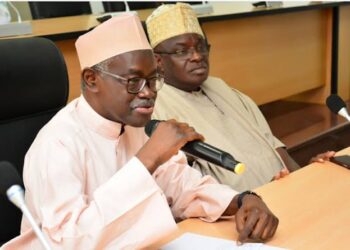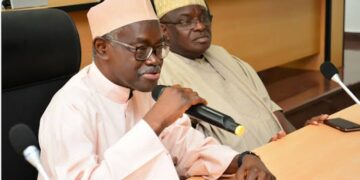In a robust appraisal of his administration’s economic and security initiatives, President Bola Ahmed Tinubu has announced significant strides in attracting foreign investments and improving national revenue. Speaking through National Security Adviser Mallam Nuhu Ribadu at a Nigeria Customs Service (NCS) conference in Abuja, Tinubu highlighted the progress made in less than two years since assuming office. The event, themed “Nigeria Customs Service Engaging Traditional and New Partners With Purpose,” showcased the government’s ongoing efforts to reform and strengthen Nigeria’s economic landscape.
President Tinubu reported that Nigeria has secured over $30 billion in foreign direct investment (FDI) within the past 17 months, a sign of increasing investor confidence in the country’s economic policies. According to the President, this influx of investment highlights the effectiveness of the administration’s reform programs, which aim to create a more favourable environment for both domestic and international investors.
“In our quest for economic revitalisation, we have received over $30 billion in investments,” Tinubu said. “This demonstrates that our policies are yielding positive results, making Nigeria a more attractive destination for investors.”
Tinubu highlighted the administration’s success in enhancing security, particularly in the volatile Niger Delta region, known for its history of insurgency and crude oil theft. The President noted that crude oil production has rebounded to 1.8 million barrels per day, a level not seen in years, signalling a significant turnaround in the nation’s oil industry.
“People in many parts of our country are now living in peace. In the Niger Delta, we have restored stability, leading to increased oil production,” Tinubu remarked. “The Southeast is also witnessing a growing sense of peace and unity, which is essential for our national development.”
The President attributed these improvements to a combination of targeted security measures and the engagement of local communities in peacebuilding efforts. Reflecting on his administration’s economic vision, Tinubu outlined a commitment to building on existing policies while implementing necessary reforms to address evolving challenges. He emphasized a focus on refining financial processes and curbing corrupt practices, particularly within key financial institutions like the Central Bank of Nigeria (CBN).
“We have maintained a clear vision for economic growth, strengthening what works and introducing new initiatives where gaps exist,” Tinubu stated. “Our reforms have made it increasingly difficult for corrupt practices to persist, especially within the CBN, where we have put stringent measures in place to prevent embezzlement.”
Tinubu also addressed past issues with the petrol subsidy regime, describing it as a drain on national resources. He affirmed that the era of subsidizing petrol, often smuggled to neighbouring countries, has ended. The decision to scrap the subsidy has redirected funds toward critical development projects, reducing opportunities for exploitation by oil marketers.
The Nigeria Customs Service (NCS) reported surpassing its 2024 revenue target of N5.07 trillion by mid-November, collecting an impressive N5.97 trillion. Comptroller-General Adewale Adeniyi announced the milestone, attributing the success to enhanced collaboration with stakeholders, improved processes, and the modernisation of the service’s systems.
“As of November 12, we have collected N5.97 trillion, exceeding our annual target with over a month to spare,” Adeniyi said. “We expect to surpass our target by at least 10 percent before the end of the year. This achievement reflects our commitment to efficient revenue collection and trade facilitation.”
Adeniyi noted that the NCS’s improved enforcement measures have led to significant seizures of illicit goods. This year alone, the service intercepted 48 containers of illegal pharmaceutical products, among other contraband items valued at N28.1 billion. The crackdown was part of a broader strategy to enhance national security and protect public health.
“We have declared a state of emergency at major ports, focusing on intercepting dangerous and illegal goods,” Adeniyi added. “Our efforts have paid off, with substantial seizures that disrupt the flow of harmful products into our country.”
The success of Tinubu’s reforms has not gone unnoticed internationally. Ribadu highlighted a surge in interest from global leaders eager to engage with Nigeria. He mentioned upcoming visits from the Prime Ministers of India and Germany, as well as invitations for President Tinubu to participate in major global forums.
“The whole world is now looking to Nigeria,” Ribadu stated. “We have seen a remarkable increase in diplomatic engagements, with leaders expressing interest in collaborating with President Tinubu and learning from our economic reforms.”
Despite the successes, the NCS faces challenges with leadership turnover. Adeniyi revealed a significant exodus of top management staff, with 60% leaving in 2022, 36% in 2023, and an estimated 40% expected to depart by the end of 2024. This trend poses potential challenges for maintaining institutional continuity and expertise.





































